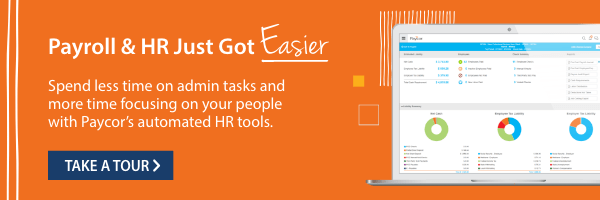Employment laws are getting more complex, often making it difficult to remain compliant. In 2021, the IRS collected nearly $7 billion from business that failed to meet their payroll tax obligations. Smaller businesses are at much greater risk of running afoul of the IRS because they tend to manage payroll through manual processes and disconnected software, leading to miscalculations, incorrect filings, and late withholdings deposits. If you’re a business leader who wants to stay on the IRS’s good side and avoid fines and penalties, here’s what you need to know.
What Payroll Taxes Are You Required to Pay?
State and federal taxes include:
- Federal unemployment tax: You must pay this tax based on the gross pay of all employees. You can pay these taxes quarterly or annually using Form 940.
- Federal and state income taxes: You must withhold these taxes from employee taxable wages and distribute them to the IRS and the appropriate states.
- FICA taxes: These taxes are more commonly referred to as Social Security and Medicare taxes. Unlike income taxes, these taxes are withheld from employee pay and matched by employers. You must pay FICA taxes either monthly or bi-weekly, depending on the size of your payroll. FICA taxes are reported quarterly on Form 941. Employer portions differ depending on the individual states. In most states employers only pay 0.6%.
What Happens if You Have Unpaid Payroll Taxes?
There are no ifs, ands or buts: If you have unpaid payroll taxes, you will be penalized. Specifically, you’ll be fined a percentage of your gross payroll deposit based on the number of days your deposit is late.
Here are the penalties for not depositing your payroll taxes on-time:
| Days Late | Penalty |
|---|---|
| 1 – 5 calendar days | 2% of the missing deposit |
| 6 – 15 calendar days | 5% of the missing deposit |
| 16 calendar days or within 10 days of first IRS notice | 10% of the missing deposit |
| More than 10 calendar days after the date of the first IRS notice requesting the tax, or the day you received notice and demand for immediate payment, whichever is earlier. | 15% of the missing deposit |
Example: Sole proprietorship, Tim’s Software, Inc. has 100 employees and owes the IRS $39,000 for monthly payroll taxes. The company pays the full amount 10 days after the due date. Tim is slapped with a 5% penalty on the $39,000 deposit and now owes the IRS an additional $1,950. For smaller organizations, this type of fine can be a major setback. What if you can’t make the full deposit? Pay the taxes you can afford! Even a partial payroll tax payment will reduce the amount of penalties you’ll receive.
What Are the Penalties for Not Depositing my Payroll Taxes?
As an owner or partner, you can be held personally liable for willful failure to withhold employee pay and payroll taxes from federal and state agencies. This is called the Trust Fund Recovery Penalty and it’s one of the most severe penalties levied by the IRS.
How much will it cost?
Example: Let’s say you pay an employee $1,000. Their paystub notes that you withheld $90 for income tax plus $50 for Social Security and $10 for Medicare. But you didn’t send any of that money to the IRS. In this case, the unpaid tax bill is $150. Now you owe this amount plus that amount again as a penalty, doubling your bill. When you employ dozens of workers, this penalty can add up quickly.
Keep in mind these are also criminal penalties that can result in a $10,000 fine and/or imprisonment for up to five years. Here’s what you can do to make sure you stay on the right side of the law.
3 Tips to Mitigate Risk
- Ensure your budget accounts for tax payments. You might be rolling your eyes at this advice, but it’s more common than you might realize for organizations to forget to include taxes in their annual budgets, especially very small employers or sole proprietors. This is a quick, simple fix that can prevent a lot of headaches.
- Automate payroll by partnering with an HR & payroll provider. If you want more time to work on important, strategic initiatives, consider automating your payroll processes. The right partner will help prevent payroll tax penalties from unpaid taxes, cut down on administrative tasks and ensure your employees are paid accurately and on time.
- Stay up to date with IRS announcements and resources. The IRS is continually publishing tax return news, tax law updates, tax tips, and form deadlines, so it’s important that you, your accountant or your payroll provider stays on top of things.
How Can Paycor Help Mitigate Your Risk?
Paycor has spent more than 30 years perfecting payroll. Our solution is the easiest and most powerful solution on the market.
- Our dedicated tax experts help you with payroll tax compliance, workers’ comp, and federal and state laws and regulations.
- We help eliminate administrative processes by empowering your employees with self-service access.
- We help you maintain accurate employee pay records.
- We improve your payroll service with general ledger integration and helpful HR resources such as employee policies, job descriptions and custom templates.
- Our Tax Compliance Dashboard provides proactive alerts to help ensure proper tax setup. When Paycor customers log in to the platform, they’ll be notified of tax errors that need attention, including missing or invalid addresses, tax IDs, access codes, or authorizations.
Learn more about the benefits of payroll software.

*This article does not contain legal advice. The information is provided for general educational purposes only and is not a substitute for legal advice.









